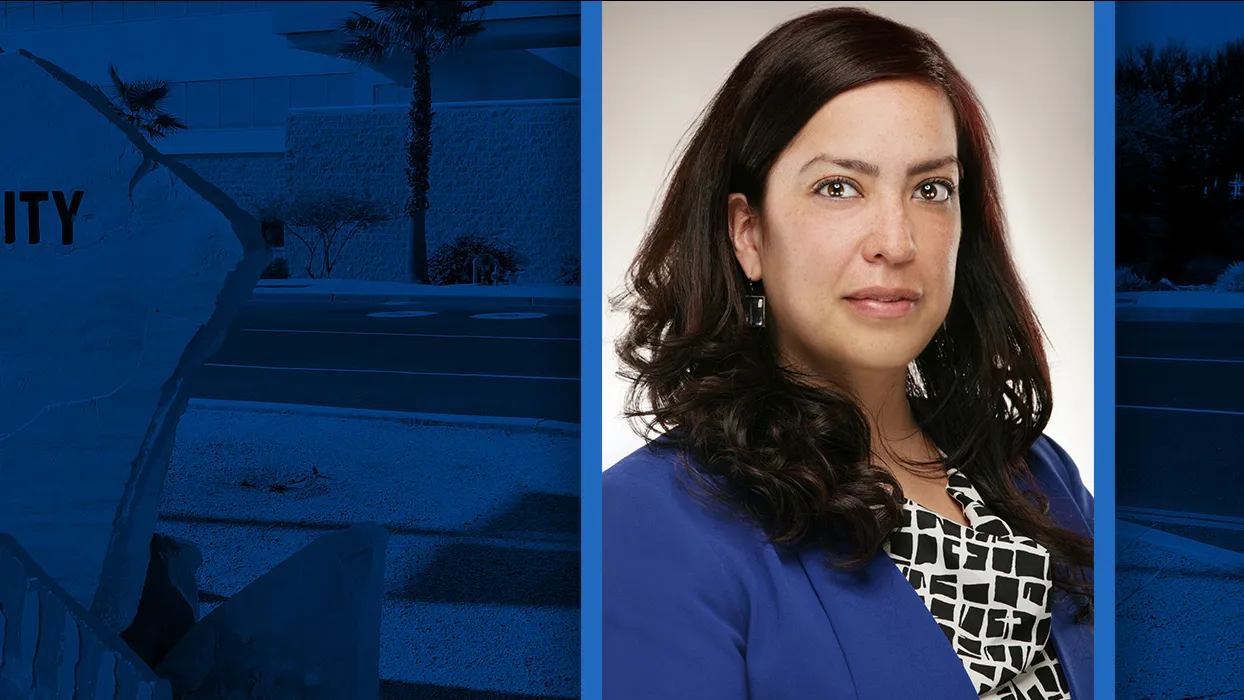Mike Singer | CSUSB Office of Strategic Communication | (760) 341-2883, ext. 78107 | msinger@csusb.edu


At CSUSB, Hispanic Heritage Month is celebrated each year from Sept. 15-Oct. 15 to highlight and celebrate the accomplishments, heritage and culture of Hispanics and Latinx populations with roots from Spain, Mexico, the Caribbean, Central and South America.
The university provides students, faculty and staff the chance to explore and become immersed in Hispanic and Latinx culture via different points of reference that will improve their education, socialization and capacity to become mature global citizens. Throughout Hispanic Heritage Month, CSUSB showcases faculty, staff, students and community leaders around significant themes in Latinx culture.
CSUSB is proud to shine a spotlight on Edna Martinez, the new associate vice president and administrator in charge of the CSUSB Palm Desert Campus, who, in addition to leading the campus, holds a tenured academic appointment in the university’s James R. Watson and Judy Rodriguez Watson College of Education.
Martinez has only been on the job since Aug. 1, but is already making great progress. She is also the first Latina to lead the Palm Desert Campus in its 37-year history.
“My Mexican heritage is the essence of who I am. I am a proud Chicana, Mexican American woman,” she said. “I treasure my cultural traditions, including the sharing of dichos (sayings), consejos (advice), and cuentos (stories), especially from my grandparents. I can listen to them over and over again. Hearing and seeing pictures and newspaper clippings about my grandfather, Francisco ‘Kiko’ Enriquez, being selected to represent Mexico on the men’s national basketball team in the 1952 Olympics in Helsinki, but ultimately not participating because of financial barriers. These stories keep me going and grounded.”
Martinez’s first language was Spanish.
“I love speaking Spanish; it’s part of who I am. I also recognize its colonial history. I sometimes think in Spanish and then translate to English,” she said. “However, sometimes there’s no direct translation. When you try to translate, it’s not the same.”
“I also want to recognize that many Latinx/Hispanic individuals in the U.S. do not speak Spanish because their language was stripped from them – very much like our Indigenous communities. Either they weren’t allowed to speak Spanish growing up, or their parents did not teach them Spanish to protect them from some of the hardships they themselves experienced. It does not make them any more or less Latino, Hispanic, etc. I recall not being allowed to speak Spanish in elementary school and being placed in special education because I spoke Spanish. I’d be on the playground speaking Spanish with my older sister, and my teacher would say, ‘No Spanish’ or ‘English only.’ My sister and I went home one day and told my mom, ‘No Spanish,’ and her response was, ‘En mi casa se habla español,’ and that’s something that I will always cherish.”
Schools and educational institutions around the world play a vital role in promoting awareness and understanding of Hispanic heritage.
“It involves a lot of self-reflection – checking our own assumptions and biases – not just valuing, but how are we disrupting the systemic inequities that our students face,” she said. “It’s not only about awareness, but appreciation, and not just during Hispanic Heritage Month. Our students’ histories, cultures and heritages should be honored all year long, embedded in our practices, curriculum and pedagogy. We need race-conscious, equity-minded educators with an understanding of social injustices.”
Individuals from various backgrounds can also participate in and support the celebration of Hispanic Heritage Month.
“Hispanic heritage should always be celebrated. We don’t need a designated month, although I understand it,” said Martinez. “Truly immerse yourself, learn the history, and don’t make a mockery out of it. It’s not about tequila, margaritas, chips and salsa.”
Martinez hopes to accomplish a lot in her new role at the campus and feels that representation and retention of leaders of color are important.
“The position comes with great pressure and responsibility, and it’s an honor that I don’t take lightly,” she said. “I want to continue to grow the campus, enhance the student experience, and ensure that faculty, staff and students have the resources they need to be successful. I don’t want PDC to be the only four-year degree option in the Coachella Valley; I want us to be the option. I want folks to say, ‘I want to go to PDC.’ We are here to serve our families, alumni and local communities.”
For more information about how Hispanic Heritage Month is celebrated at CSUSB, visit the Hispanic Heritage Month webpage.
About PDC: The CSUSB Palm Desert Campus offers bachelor’s and master’s degrees, a doctorate in educational leadership, teaching credentials and certificates. Serving more than 2,200 students, it is the Coachella Valley’s four-year public university and plays a vital role in educating and training the region’s growing population.
For more information about the CSUSB Palm Desert Campus, contact Mike Singer in the Office of Strategic Communication at msinger@csusb.edu or (760) 341-2883, ext. 78107, or visit the PDC website at www.csusb.edu/pdc.